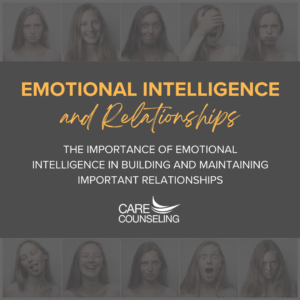The Power of Emotional Intelligence in Relationships
 In the realm of relationships, emotional intelligence plays a crucial role in fostering understanding, effective communication, empathy, and conflict resolution. The ability to navigate our emotions and understand those of others is the foundation of building and maintaining healthy connections. Let’s explore the significance of emotional intelligence in relationships and discuss practical ways to enhance it for more fulfilling and harmonious interactions.
In the realm of relationships, emotional intelligence plays a crucial role in fostering understanding, effective communication, empathy, and conflict resolution. The ability to navigate our emotions and understand those of others is the foundation of building and maintaining healthy connections. Let’s explore the significance of emotional intelligence in relationships and discuss practical ways to enhance it for more fulfilling and harmonious interactions.
Understanding Emotional Intelligence:
Emotional intelligence refers to the capacity to recognize, understand, and manage our own emotions, as well as being able to perceive and empathize with the emotions of others. It involves self-awareness, self-regulation, social awareness, and relationship management. When individuals possess high emotional intelligence, they are better equipped to navigate the complexities of relationships and create meaningful connections.
Effective Communication:
One of the pillars of emotional intelligence in relationships is effective communication. It involves expressing oneself clearly and listening attentively to others. By being aware of our own emotions and needs, we can effectively communicate our thoughts and feelings, while also being open to understanding the perspectives of our partners or loved ones. Through active listening, non-verbal cues, and validation, we can foster a safe and supportive environment for open and honest communication.
Empathy and Understanding:
Empathy is another key aspect of emotional intelligence that plays a vital role in relationships. It involves putting we in someone else’s shoes and genuinely understanding their emotions, experiences, and perspectives. By practicing empathy, we can foster deeper connections, validate the feelings of our loved ones, and create a space where they feel heard and understood. Empathy allows us to respond with compassion and support during both joyful moments and challenging times.
Conflict Resolution:
Conflict is an inevitable part of any relationship, but emotional intelligence can greatly influence how conflicts are resolved. With emotional intelligence, we can manage our own emotions during disagreements and approach conflicts with a solution-oriented mindset. By practicing active listening, seeking to understand the underlying needs and concerns of both parties, and finding mutually beneficial solutions, we can navigate conflicts in a constructive manner, leading to growth and stronger relationships.
Enhancing Emotional Intelligence:
Fortunately, emotional intelligence can be developed and strengthened over time. Engaging in self-reflection, mindfulness practices, and seeking feedback from trusted individuals can help raise self-awareness. Reading books and attending workshops on emotional intelligence can provide valuable insights and strategies. Additionally, cultivating empathy through acts of kindness, active listening, and volunteering can expand our understanding of others’ experiences and emotions.
In the realm of relationships, emotional intelligence serves as a powerful tool for building and maintaining healthy connections. By fostering effective communication, empathy, and conflict resolution skills, we create an environment of understanding and support. Developing emotional intelligence is a lifelong journey, but the benefits it brings to our relationships are immeasurable. As we continue to enhance our emotional intelligence, we can forge deeper connections, resolve conflicts with grace, and experience more fulfilling and harmonious relationships.



























